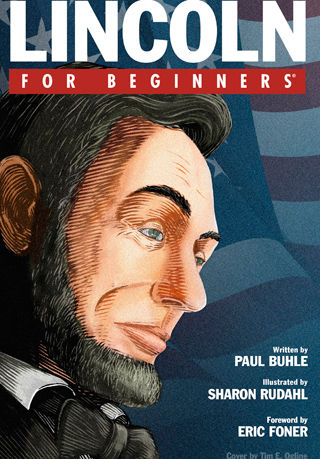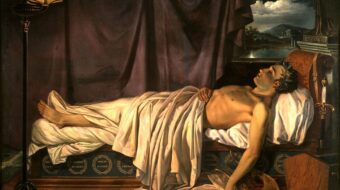
Reflecting upon the life of his friend Abraham Lincoln, the great self-educated black advocate for emancipation Frederick Douglass wrote about him in 1876, 11 years after Lincoln’s death:
“Though deep, he was transparent, though strong, he was gentle. He was tolerant toward those who differed from him and patient under reproaches…. His great mission was to accomplish two things: First, to save his country from dismemberment and ruin, and, second, to free his country from the great crime of slavery…. Taking him for all in all, measuring the tremendous magnitude of the work before him, infinite wisdom has seldom sent any man into the world better suited for his mission than Abraham Lincoln.”
These words are in fact the last words in the prolific historian Paul Buhle’s “Lincoln for Beginners,” the latest installment of a series that includes many political and literary personalities alongside a couple of dozen important thematic subjects in sciences, philosophy, religion and the arts.
Final words usually signify a point of view, a summing up, and it is hardly accidental that Buhle has looked to Douglass to provide the guiding spirit behind his effort at condensing our 16th president’s life and purpose into a simple, well-told but brief accounting.
Buhle’s Lincoln is not the self-made mythic hero who cleared the land, chopped wood, studied by candlelight, debated Stephen Douglas and emancipated the slaves. Rather, he is a man of profound complexity, a melancholic, at times depressive figure who entertained notions of suicide, on whose shoulders fell the terrible weight of his country’s history at a painful turning point in the road.
How to move away from slavery while preserving the American constitutional system, and indeed the integrity of the nation, was the challenge Lincoln faced. Given the vacillating, amoral political leadership in America before Lincoln – and succeeding him as well – with their fatal penchant toward unjust compromises and selling out to powerful commercial and financial interests, few can stand beside Lincoln with any degree of righteousness.
Knowing how dangerous it is to judge according to the standards of a different time, Buhle takes on the subject of “The Great Exception: Native Americans” in a separate subchapter. “[O]nly few Native Americans could find any reason to celebrate Lincoln,” he says; in fact, feeling betrayed over and over by the federal government, many tribes responded to Confederate promises and joined the “Lost Cause” to see what better deal they might get. Perhaps in less turbulent times Lincoln’s “better angels” might have allowed him the space to offer a more benevolent treatment to America’s First Nations.
Buhle is clear in describing the political landscape of the time when Lincoln emerged as a political figure, first with the Whig Party, which opposed the Mexican War in the late 1840s, and then with the new radical Republican Party, which sought to end slavery. He became a firm republican advocate in response to the turmoil in Europe in 1848-49, supporting “the right of any people…to throw off, to revolutionize, their existing form of government and to establish such other in its stead as they may choose.” He saw slavery as hopeless, free labor as the future, and openly allied with the rising labor movement in the United States, especially for his 1864 re-election. Buhle reminds us that “he would one day hail the formation of the International Workingmen’s Association in Europe, headed by Marx.”
Lincoln‘s gradual evolution
An overarching theme in Buhle’s short study, and well for current activists to keep in mind, is the gradualness and incompleteness of Lincoln’s evolution. Subject to “essentialist” arguments over what the “essence” of America was and would become, Lincoln proceeded not always in a straight line, but driven as time, place and circumstances changed, by necessity and possibility.
Lincoln was famously known during the Civil War period for abrogating constitutional rights to free speech. He once asked, in the heat of battle for the Union, “Must I shoot a simple-minded soldier who deserts” – and there were many – “while I must not touch a hair of a wily agitator who induces him to desert?”
Whole libraries are dedicated to the study of Abraham Lincoln, and the controversies abound. Buhle’s synopsis, reflecting all the warts and charm of his subject, might a good place for anyone to begin, especially a high school student. Those who consider themselves more learned in American history might still benefit from seeing how Lincoln is viewed today by a historian with strong ties to the 20th- and 21st-century radical movement.
Sharon Rudahl’s work has appeared in underground newspapers and magazines, Marvel Comics, and also in Paul Buhle’s “Wobblies!: A Graphic History.” Her drawings are interpolated throughout the book on an average of every third page or so, but there are also seven several pages-long “comics interludes” that summarize the story in picture and text (“Young Abraham,” “Lincoln Takes a Wife,” “A House Divided,” “Lincoln in the White House,” “Father Abraham,” “War is Hell,” and “Victory and Vengeance”) and provide compelling visual detail expressive of the period and the large cast of characters.
The last chapter, “Lincoln’s Legacy,” begins with a quote from historian W.E.B. Du Bois, in which he speaks of the African American people who in their third century of slavery “arose from the dead, in the finest effort to achieve democracy of the working millions which this world had ever seen.”
Buhle then goes on: “As Du Bois suggests, a different outcome in the American South after the war – a true success for Reconstruction – would have sent a powerful message of multiracial democracy at a time when European colonialism was racing through Africa and Asia, leaving a trail of destroyed lives numbering in the millions.” The author proceeds in far-ranging thought to tie together the strands of history up to present times, showing where Lincoln’s achievements bore fruit, and where the coalition of progressive interests he brought together fell apart “to the detriment of all parts.”
The elections of Barack Obama n 2008 and 2012 “brought a sense of relief, at least briefly, to a nation weary of racial controversy and conflict. Yet suspicion and hatred, if not gross discrimination, had already turned toward Muslims, the most recent ‘outsiders’ viewed as a threat to the social order. And the gap between rich and poor continued to expand, with no changes in sight. Was this the America upon which Abraham Lincoln had staked his devotion and his very life to save? The question hangs fire.” These last words sound slightly antiquarian, yet also pointedly summon up modern-day lynchings and visions of “the fire next time.”
“Lincoln for Beginners”
By Paul Buhle, illustrated by Sharon Rudahl, foreword by Eric Foner
A For Beginners Documentary Comic Book, 2015, 167 pp., $15.95.












Comments